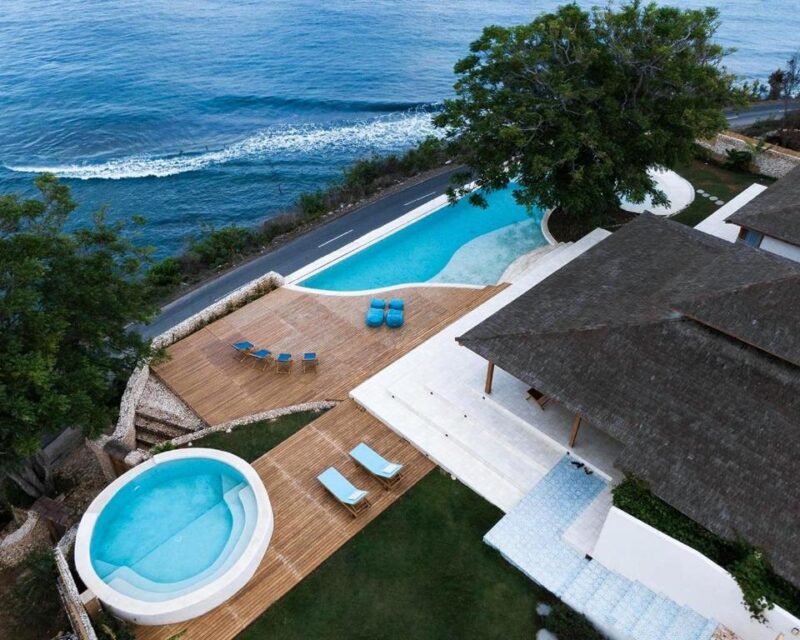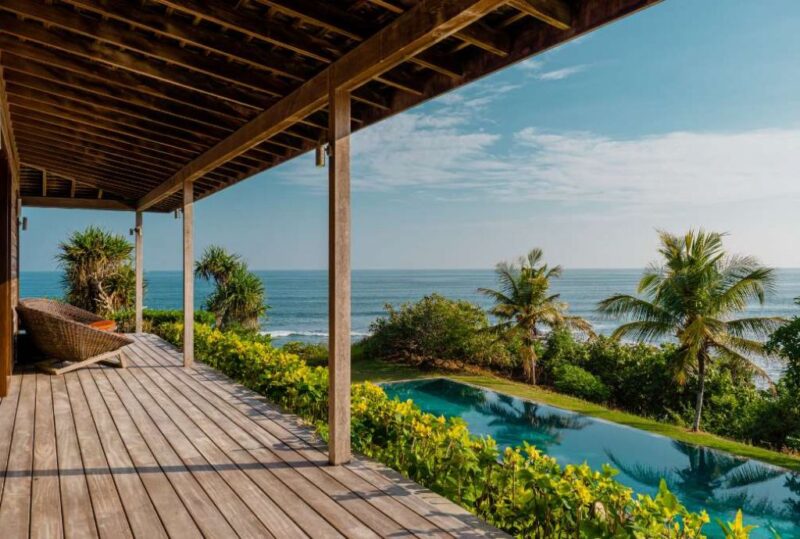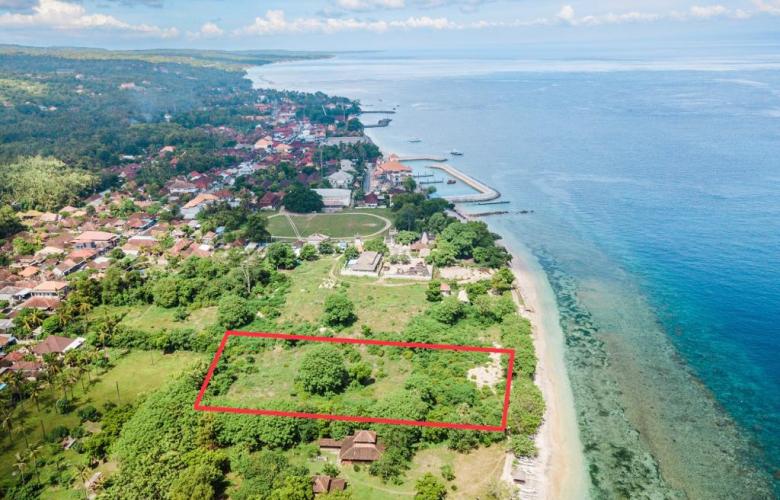Dreaming of owning a slice of paradise in Indonesia? Nusa Penida, a gorgeous island located southeast of Bali, has quickly become a hotspot for those seeking a tropical retreat.
With its clear blue waters, untouched landscapes, and growing tourism industry, it’s easy to see why so many are drawn to invest here.
If you’re considering buying land in Nusa Penida as a foreigner, there are specific things to keep in mind to make everything smooth and rewarding.
Here’s what you should know about purchasing land here as a foreigner in 2024.
Indonesian Property Ownership Laws for Foreigners

When it comes to land ownership, Indonesian law can be restrictive. In Indonesia, only citizens can legally own freehold land (Hak Milik).
However, foreigners aren’t without options. There are legally accepted pathways to land ownership in Indonesia, though it’s more about gaining rights rather than direct ownership.
Options for Foreign Property Investment in Indonesia
- Leasehold Agreements (Hak Sewa): This allows foreigners to lease land for a long period, typically 25 to 30 years, with an option for extension. Through this, you gain the right to use the land but not to own it outright.
- Right to Use (Hak Pakai): Hak Pakai permits foreign nationals to use land for residential purposes. Initially, it’s granted for 30 years and can be extended for up to 80 years, provided you hold a temporary or permanent stay permit (like KITAS or KITAP).
- Right to Build (Hak Guna Bangunan – HGB): If you’re looking to develop property, such as a commercial building or resort, establishing a foreign-owned company (PT PMA) allows you to acquire the HGB title. The HGB grants building rights for up to 30 years, with the option to extend for up to 80 years.
Each option has its advantages, but selecting the right one depends on your goals, whether they’re residential, commercial, or otherwise.
If you want a comprehensive overview of property ownership laws in Indonesia, including options available to foreign investors, visit PenidaLand.
Setting Up a PT PMA – A Common Strategy
Setting up a PT PMA (a foreign-owned company) is a smart approach if you’re serious about property investment in Nusa Penida. Through a PT PMA, foreign investors can acquire the HGB title, making it an ideal choice for those planning commercial projects.
Steps to Set Up a PT PMA
- Company Registration: Register your PT PMA with the Indonesian Investment Coordinating Board (BKPM).
- Capital Requirements: Indonesian law mandates specific capital requirements for foreign-owned companies, which must be met.
- Compliance Requirements: A PT PMA needs to comply with all operational and reporting standards set by Indonesian law.
Setting up a PT PMA involves navigating a few legal processes, so working with a legal professional who knows the ropes of Indonesian corporate law can make a huge difference.
Conducting Due Diligence and Legal Checks
Purchasing land anywhere comes with its own set of challenges, and Nusa Penida is no exception. Due diligence is crucial to protect your investment and avoid any nasty surprises down the road.
Key Legal Checks to Conduct
- Land Title Verification: Confirm that the land has a clear title with no existing disputes or liens.
- Zoning Regulations: Different areas in Nusa Penida are zoned for specific purposes. Check that your land is appropriately zoned for what you intend to build, whether it’s residential, commercial, or agricultural.
- Environmental and Coastal Assessments: Nusa Penida is known for its ecologically sensitive areas. If your land is near the coast or in a protected area, you may face certain restrictions.
- Building Permits: Before you break ground, ensure you have the necessary building permits. Construction in Nusa Penida must align with local building standards.
Working with a local notary (Pejabat Pembuat Akta Tanah – PPAT) and legal experts familiar with the area’s property regulations will help you cover all your bases.
Financial Aspects to Consider
Financial planning is crucial for any real estate investment, especially if you’re entering a foreign market. Here’s what to consider when budgeting for your land purchase in Nusa Penida.
Cost Considerations
- Land Prices: Land in Nusa Penida is becoming increasingly popular, so prices vary significantly based on factors like location, land size, and proximity to tourist spots. In 2024, land prices range from IDR 500 million to IDR 3 billion.
- Taxes and Fees: Besides the purchase cost, be prepared for additional expenses. Common ones include:
- Land and Building Acquisition Duty (BPHTB): This tax is calculated based on the property’s value.
- Annual Property Taxes: These are recurring and depend on your land’s assessed value.
- Notary and Legal Fees: Budget for fees to cover essential legal documentation and advice.
- Financing Options: Indonesian banks generally don’t offer mortgage services to foreigners, so having access to funds is crucial. If you’re not a cash buyer, consider financing options available in your home country or alternatives.
Market Trends and Investment Potential in Nusa Penida

Nusa Penida has experienced a boom in tourism in recent years, which has, in turn, fueled real estate demand. If you’re interested in developing villas, resorts, or other tourist-oriented properties, there’s ample potential. However, like any emerging market, keeping a finger on the pulse of local trends and infrastructure projects is key.
- Tourism Growth: With more tourists flocking to Nusa Penida each year, the demand for accommodations, dining, and recreational spaces is on the rise.
- Infrastructure Developments: The local government is investing in infrastructure improvements, which could increase property values over time.
- Sustainable and Eco-Friendly Opportunities: Eco-conscious investments are gaining popularity on the island, allowing investors to build responsibly while catering to a growing segment of eco-tourists.
Environmental and Cultural Sensitivity
Nusa Penida is celebrated not only for its natural wonders but also for its rich cultural heritage. As a foreign investor, respecting the local environment and culture can help you build strong relationships with the community.
Local residents appreciate efforts to preserve Nusa Penida’s beauty, so consider eco-friendly designs and sustainable practices for your project.
Some ways to positively engage with the community include:
- Hiring Local Labor and Services: Providing employment opportunities to locals boosts the economy and fosters goodwill.
- Supporting Environmental Initiatives: Whether through funding clean-up drives or using green construction materials, sustainable efforts make a positive impact.
- Respecting Cultural Norms: Engage with the local community, learn about their customs, and show respect for traditions.
By investing with care, you’re not only preserving Nusa Penida’s environment but also enriching your own experience as a part of this vibrant island community.
Final Thoughts

Acquiring land in Nusa Penida as a foreigner in 2024 is an exciting and feasible endeavor, provided you adhere to Indonesian property laws and take the necessary legal steps.
If you’re interested in a quiet residential retreat or a commercial venture, options like leasehold agreements, Hak Pakai, and setting up a PT PMA make it possible to invest in this paradise.
A careful approach to due diligence, financial planning, and community engagement will help set you up for a successful investment.
Investing in a place like Nusa Penida offers more than just financial returns; it’s about becoming part of a special destination with a rich culture, spectacular landscapes, and boundless potential.
With the right steps, you’ll find this journey both fulfilling and profitable, creating your own piece of paradise in Indonesia’s beautiful island gem.

